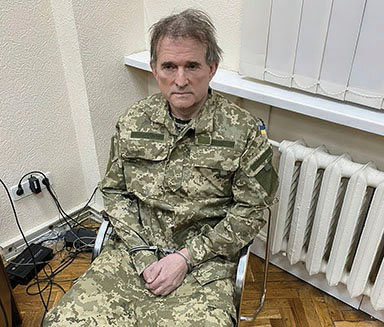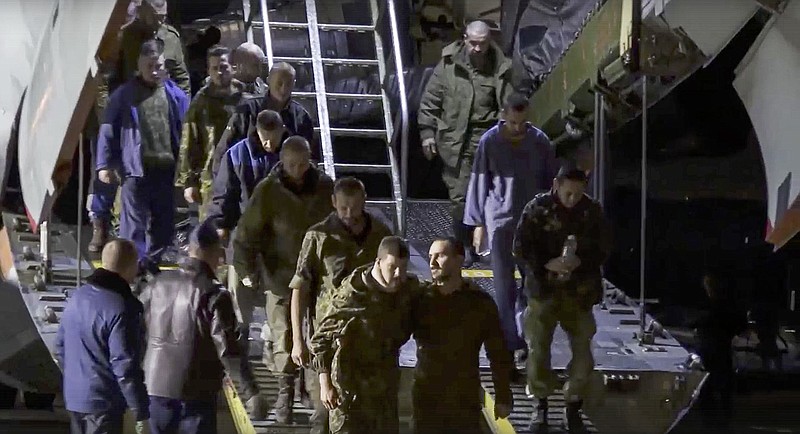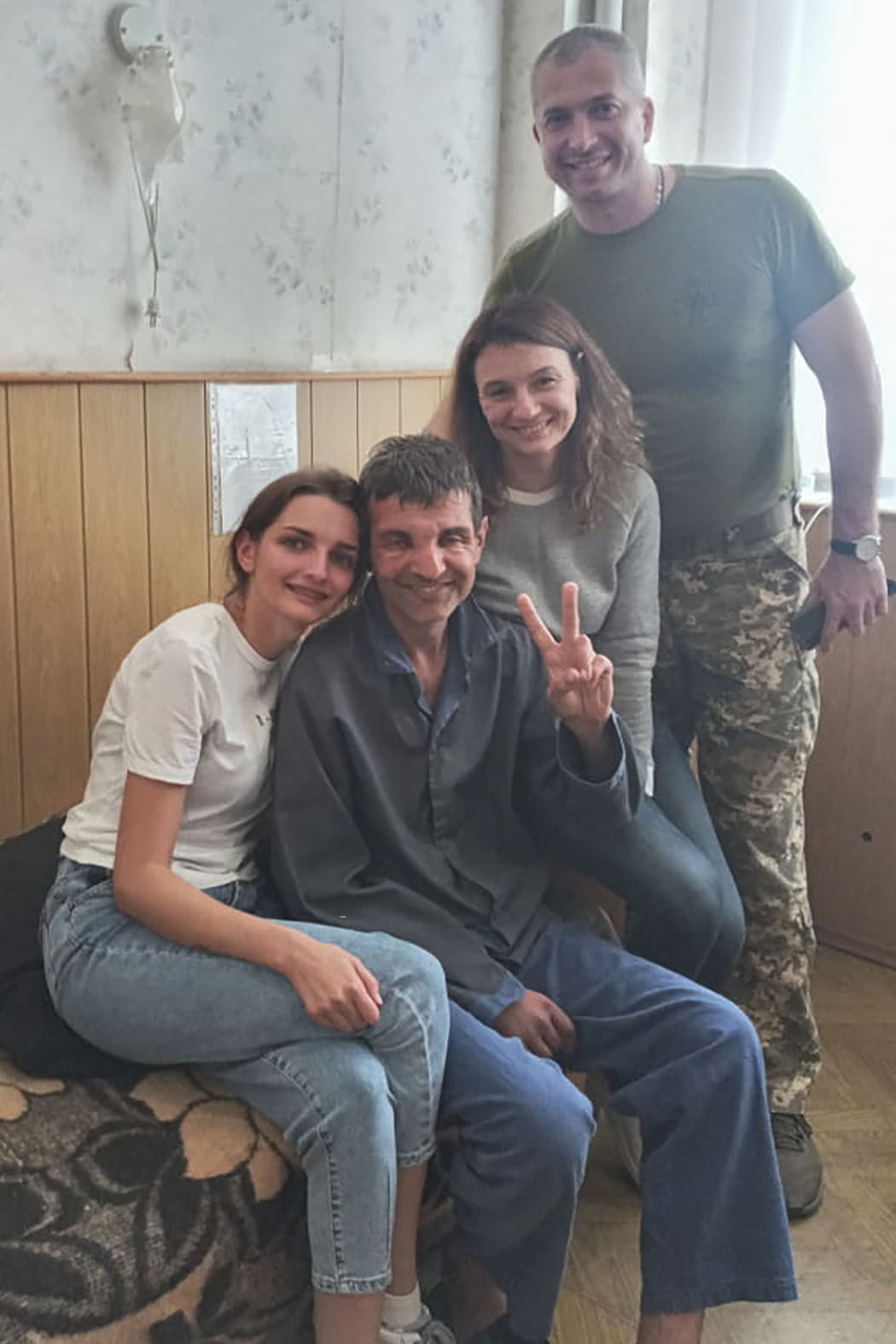ZAPORIZHZHIA, Ukraine -- Russian and Ukrainian forces exchanged missile and artillery barrages on Thursday as both sides refused to concede ground despite recent military setbacks for Moscow and the toll on the invaded country after almost seven months of war.
Russian missile strikes in the southern city of Zaporizhzhia left one person dead and five wounded, Ukrainian officials said. Officials in the separatist-controlled city of Donetsk said Ukrainian shelling killed at least six people.
While the hostilities continued, the two sides did manage to agree on a major prisoner swap.
Kyrylo Tymoshenko, the deputy of the Ukrainian president's office, said a hotel in Zaporizhzhia was struck and rescuers were trying to free people trapped in rubble.
The governor of the Zaporizhzhia region, Oleksandr Starukh, said Russian forces had targeted infrastructure and damaged apartment buildings. The region is one of four where Moscow-installed officials plan to hold referendums starting Friday on becoming part of Russia, but the city itself is in Ukrainian hands.
The mayor of the separatist-controlled city of Donetsk, Alexei Kulemzin, said Ukrainian shelling hit a covered market and a minibus. Overnight, one person was killed during Russian shelling in Nikopol, across the river from the Zaporizhzhia Nuclear Power Plant, according to the Dnipropetrovsk regional governor.
Just hours before Thursday's attacks, the high-profile prisoner swap saw the announcement of an exchange of 215 Ukrainian and foreign fighters -- 200 of them for a single person, an ally of Putin's. Denis Pushilin, head of the self-proclaimed Donetsk People's Republic, confirmed that the Putin ally, pro-Russian Ukrainian opposition leader Viktor Medvedchuk, was part of the swap.
Medvedchuk came to know Putin while serving as chief of staff for former Ukrainian President Leonid Kuchma. The Russian leader is the godfather of Medvedchuk's daughter. His detention sparked a heated exchange between officials in Moscow and Kyiv.
Medvedchuk is the head of the political council of Ukraine's pro-Russian Opposition Platform For Life party, the largest opposition group in Ukraine's parliament. The Ukrainian government has suspended the party's activity; Putin has repeatedly spoken about Medvedchuk as a victim of political repression.
"It is not a pity to give up Medvedchuk for real warriors," President Volodymr Zelenskyy said in his nightly video speech. "He has passed all the investigative actions provided by law. Ukraine has received from him everything necessary to establish the truth in the framework of criminal proceedings."
More than 2,000 defenders, many in the Azov Regiment, marched out of the Azovstal steel plant's twisted wreckage into Russian captivity in mid-May, ending a nearly three-month siege of the port city of Mariupol.
Among the freed fighters were Ukrainian defenders of the steel plant in Mariupol during the long Russian siege, along with 10 foreigners, including five British citizens and two U.S. military veterans, who had fought with Ukrainian forces. Some of those freed had faced death sentences in Russian-occupied areas.
Ukraine's military intelligence chief, Kyrylo Budanov, told reporters in Kyiv that most of the prisoners freed by Russia were "more or less in an OK state physically, except for food malnutrition related to the bad detention conditions." He said some prisoners had been tortured but didn't give any details.
Zelenskyy said the five leaders, including Azov Regiment commanders Denys Prokopenko and Svyatoslav Palamar, are in Turkey, where they will remain as part of the deal "in complete safety" until the end of the war, under the protection of Turkish President Recep Tayyip Erdogan.
A video on the BBC news website Thursday showed two of the released British men, Aiden Aslin and Shaun Pinner, speaking inside a plane.
"We just want to let everyone know that we're now out of the danger zone and we're on our way home to our families," Aslin said in the video, as Pinner added: "By the skin of our teeth."
The continuation of Russian missile attacks and beginning of a partial mobilization of Russians into the armed forces suggested the Kremlin was seeking to dispel any notion of weakness or waning determination to achieve its wartime aims in light of recent battlefield losses and other setbacks that undercut the aura of Russian military might.
Putin's order Wednesday of a partial mobilization of reservists to bolster his forces in Ukraine sparked rare protests in dozens of Russian cities and was derided in the West as an act of weakness and desperation. More than 1,300 Russians were arrested in the anti-war demonstrations, according to the independent Russian human rights group OVD-Info.
Putin's partial call-up was short on details, raising concerns of a wider draft that sent some Russians scrambling to buy plane tickets to flee the country. One Russian man who arrived in the Armenian capital's airport with his 17-year-old son said he had made plans for such a scenario.
Kremlin spokesman Dmitry Peskov said the mobilization was needed because Russia was "de facto facing all of NATO," a reference to the military aid and other support that alliance members have given Ukraine.
Ratcheting up tensions, a senior Kremlin official on Thursday repeated Putin's threat to use nuclear weapons if Russian territory comes under attack.
Dmitry Medvedev, deputy head of Russia's Security Council, said on his messaging app that strategic nuclear weapons are one of the options to safeguard Russian-controlled territories in eastern and southern Ukraine. The remark appeared to serve as a warning that Moscow could also target Ukraine's Western allies.
Russia's neighbors have been on edge about a possible threat from Russia, and one of them, Estonia, announced it was starting an exercise Thursday for nearly 2,900 reservists and volunteers, in an apparent counter to Moscow's announcement of a partial military mobilization.
Information for this article was contributed by Hanna Arhirova, Karl Ritter, Sylvia Hui and Nicolae Dumitrache of The Associated Press.
 In this image provided by the Ukrainian Presidential Press Office, oligarch Viktor Medvedchuk, who is both the former leader of a pro-Russian opposition party and a close associate of Russian leader Vladimir Putin, sits handcuffed after being detained in a special operation carried out by the country's SBU secret service, Tuesday, April 12, 2022, in Ukraine. (Ukrainian Presidential Press Office via AP)
In this image provided by the Ukrainian Presidential Press Office, oligarch Viktor Medvedchuk, who is both the former leader of a pro-Russian opposition party and a close associate of Russian leader Vladimir Putin, sits handcuffed after being detained in a special operation carried out by the country's SBU secret service, Tuesday, April 12, 2022, in Ukraine. (Ukrainian Presidential Press Office via AP)
